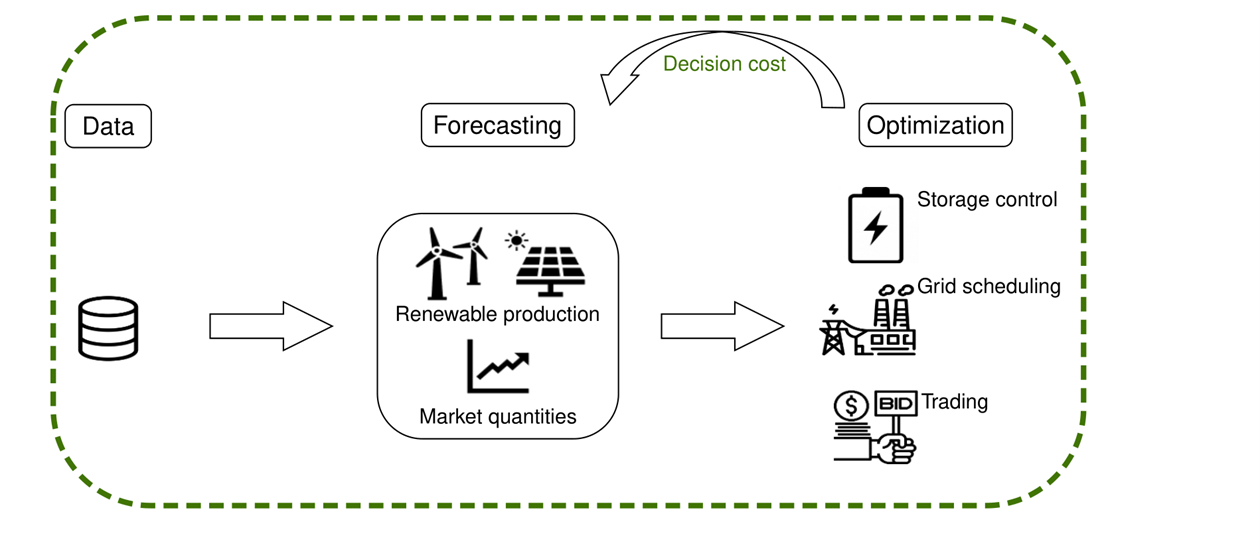Prescriptive analytics methods for energy forecasting and optimization in power systems
The integration of renewable energy sources in the generation mix is pivotal to tackle the adverse effects of climate change. However, the stochastic nature of weather-dependent energy sources raises several challenges in the operational management of modern power systems. Concurrently, as electricity grids are modernized, there is an influx of available data from various sources such as sensors, smart meters, and markets. The combination of large-scale data sets, increased computational resources, and the advent of machine learning, are leading to the burgeoning development data analytics tools tailored to the energy sector. Typically, data-driven decision making involves a sequential process with two components, forecasting and optimization. The first involves forecasting uncertain quantities, e.g., renewable production or market quantities, at a future time interval and in a form that ranges from point forecasts to probabilistic forecasts, scenarios, and uncertainty sets. Next, these forecasts are employed as inputs in an optimization problem to derive optimal decisions (prescriptions).

However, increased forecast accuracy does not always translate into increased forecast value, i.e., reduced costs in the overall model chain. Further, decision costs are rarely symmetric, which conflicts with the standard metrics that measure predictive performance. In his Ph.D. work, Akylas takes a value-driven viewpoint and proposes a holistic framework for joint forecasting-optimization in power systems. The overarching goal is to increase value in data-driven decision-making processes in power systems and electricity markets by jointly examining predictive and prescriptive analytics tools. Specifically, the aim is to close the loop between forecasting and optimization and train forecasting models to derive predictions that explicitly minimize downstream decision costs (value-oriented forecasting). A conceptual overview of the proposed framework is presented in the figure below. This enables to learn a policy that derives decisions conditioned on contextual information, and, further, to assess the impact of contextual information on prescriptive performance.
Figure: standard sequential ‘forecast, then optimize’ modelling approach. Green highlights the proposed framework to close the loop between forecasting and optimization.
More about Akylas Stratigakos
On his background
Akylas obtained his Diploma in Electrical and Computer Engineering from the University of Patras, Greece in 2016. From 2017 to 2020 he worked as a Research Engineer for the Greek Transmission System Operator, where he contributed to several H2020 programmes. Currently, he is pursuing the PhD degree at Center PERSEE, Mines Paris – PSL.
Current title: PhD student
On his research interests
His research interests include energy forecasting, decision making under uncertainty, and machine learning applications for modern power systems.
On choosing Smart4RES and Mines Paris for his research
“Smart4RES features an amazing cohort with several prominent names in the area of forecasting and data analytics for the energy sector. Choosing Smart4RES, and in particular Mines Paris – PSL, is thus an easy choice for any aspiring researcher in the area of energy analytics.”
Where he sees himself in 5 years
“My goal is to continue working on research that contributes to the transition towards a decarbonized electricity grid.”
Mentors with an impact:
“I have to mention my former manager and mentor, Dr. G. Papaioannou, who instilled into me a passion for the research process and encouraged me to pursuit the PhD degree.”

